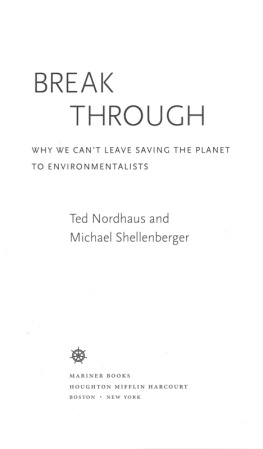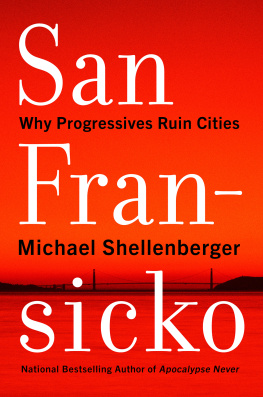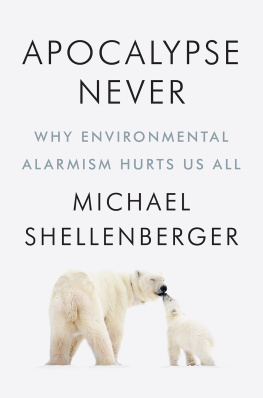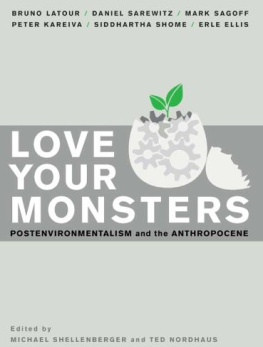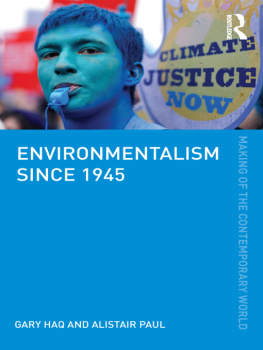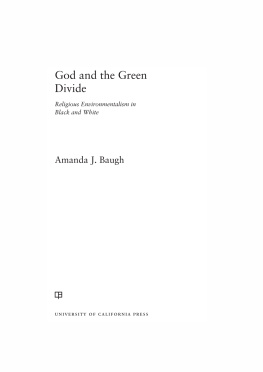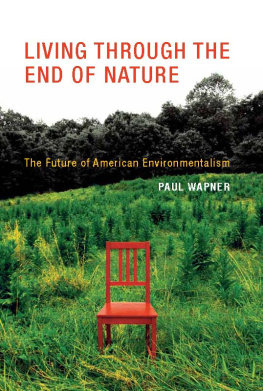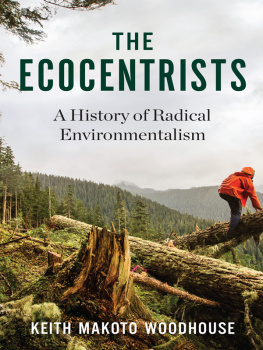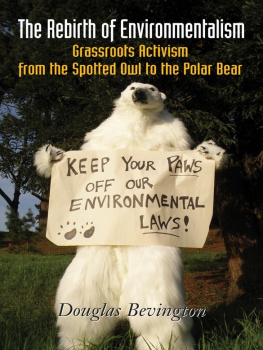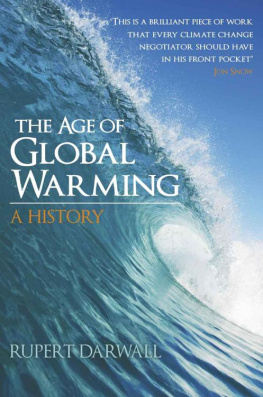Copyright 2007 by Ted Nordhaus and Michael Shellenberger
ALL RIGHTS RESERVED
For information about permission to reproduce selections from this book, write to or to Permissions, Houghton Mifflin Harcourt Publishing Company, 3 Park Avenue, 19th Floor, New York, New York 10016.
hmhco.com
The Library of Congress has cataloged the print edition as follows:
Nordhaus, Ted.
Break through: from the death of environmentalism to the politics of possibility / Ted Nordhaus and Michael Shellenberger.
p. cm.
Includes bibliographical references and index.
ISBN -13: 978-0-618-65825-1
ISBN -10: 0-618-65825-4
1. EnvironmentalismPolitical aspectsUnited States. 2. Environmental policyUnited States. 3. Political ecology United States. 4. United StatesPolitics and government. I . Shellenberger, Michael. II . Title.
GE 197. N 67 2007 333.72 dc22 2007018307
e ISBN 978-0-547-34837-7
v4.0318
Excerpts from I Have a Dream are reprinted by arrangement with The Heirs to the Estate of Martin Luther King Jr., c/o Writers House as agent for the proprietor, New York, NY. Copyright 1963 Martin Luther King Jr.; copyright renewed 1991 Coretta Scott King.
Introduction
From the Nightmare to the Dream
T HIS BOOK was born from an essay, The Death of Environmentalism: Global Warming Politics in a Post-Environmental World, that we wrote in the fall of 2004. We released the essay in pamphlet form at the annual conference of environmental donors and grantees, hoping to spark a conversation among insiders. What we didnt expect was that it would be read and debated by such a diverse audience, from college students to corporate executives, everywhere from Italy to Colombia to Japan, or that it would become a projection screen for the hopes and anxieties of the broader progressive community in the United States.
After all was said and done, the passages of our essay that seemed to resonate the most with readers were those that criticized environmentalists for their doomsday discourse. The most quoted lines in the essay were these:
Martin Luther King Jr.s I have a dream speech is famous because it put forward an inspiring, positive vision that carried a critique of the current moment within it. Imagine how history would have turned out had King given an I have a nightmare speech instead.
We went on to contrast the environmental movements complaint-based approach to politics with Kings positive visionand called on environmentalists to replace their doomsday discourse with an imaginative, aspirational, and future-oriented one.
What we didnt know at the time we wrote those words was that King had given an I have a nightmare speech. In fact, he had given it just moments before he gave his I have a dream speech.
The setting was the August 28, 1963, March on Washington. Hundreds of thousands of people had crowded before the Lincoln Memorial, on the Washington Mall, to hear King and other leaders rally the country to support civil rights legislation. Millions of others watched on television, where the speech was carried live by all three networks.
President John F. Kennedy had just returned from Germany; against the backdrop of the Berlin Wall, he had called for freedom for those living behind the Iron Curtain. On his return, Kennedy asked King to call off the demonstration. We want success in Congress, the president said, not just a big show at the Capitol.
Kennedys comment tipped King into a dark mood. The worst manifestations of human nature were on display in the Southbigotry, beatings, cowardice, murderand King was intent on making sure that white America, Kennedy included, faced up to them. And so, a few minutes before he was to speak, King leaned over to the gospel singer Mahalia Jackson, who had been traveling the country with him, and whispered, Before I speak I want you to sing I Been Buked and I Been Scorned. When Jackson told her stage manager of Kings request, he replied, We need a song thats a little livelier than that! But Jackson did as King requested. Dere is trouble all over dis world, children, she sang. Dere is trouble all over dis world.
The operating metaphor in Kings nightmare speech was the debt white America owed African Americans. Weve come to our nations capital to cash a check, he said, but instead of honoring this sacred obligation, America has given the Negro people a bad check, a check that has come back marked insufficient funds. The words revealed Kings fears that the march wouldnt be taken seriously by It was perhaps the darkest and most discouraged speech King ever gave.
But then something strange and wonderful happened. A voice rang out from the back of the dais. It was Mahalia Jackson. Tell them about your dream, Martin! She could feel that King had dwelt too long in the dark valleyhe needed to bring the crowd up to the sunlit mountaintop. Having heard him give riffs of the dream speech to earlier audiences, Jackson knew just what King needed to do. Tell them about the dream! she cried once more.
King seemed to address his next lineLet us not wallow in the valley of despairas much to himself as to the crowd. He then patteredI say to you today my friendand paused, triggering soft applause from the tired audience and buying himself the time he needed to reorganize his thoughts.
King then seemed to find the words Mahalia Jackson had tossed him, and he began the new speech. And so even though we face the difficulties of today and tomorrow, I still have a dream? From there King led the hot crowd in a rapid climb out of the valley.
[W]hen we allow freedom to ring, when we let it ring from every village and every hamlet, from every state and every city, we will be able to speed up that day when all of Gods childrenblack men and white men, Jews and Gentiles, Protestants and Catholicswill be able to join hands and sing in the words of the old Negro spiritual: Free at last! Free at last! Thank God Almighty, we are free at last!
With the words Thank God Almighty, we are free at last, racial integration suddenly felt inevitable.
Even the nervous Kennedy, who was watching the speech live on television down the street, was impressed. Hes damn good, he told
Three months later Kennedy was dead, but his successor, Lyndon Johnson, surprised nearly everyone and became an aggressive pursuer of Kings dream. Over the next two years, Congress passed, and President Johnson signed, the sweeping Civil Rights and Voting Rights acts. And while those laws might have been enacted no matter what speech King had given, it is unlikely that history would have unfolded as peacefully or as quickly as it did had it not been for Kings dramatic and mysterious leap from the nightmare to the dream.
1.
One unfortunate consequence of having quoted Dr. King in our essay was that we ended up tapping into that apparently inexhaustible reservoir of nostalgia for the 1960s. The truth is that Kings dramatic leap from the nightmare to the dream can be a parable for the future only if we first understand how much the world has changed since 1963.
Schools today are still segregated, but for reasons vastly more complex than Jim Crow. Americans of all colors are living roughly a decade longer, thanks in part to advances in medicine. Our homes and cars are larger, and more of us own them. We take such luxuries as air conditioning, cell phones, and inexpensive air travel for granted. And our air and water are far cleaner. Our unprecedented wealth and freedom have profoundly changed what we care about, aspire to, and believe in, so its no wonder that the old political and moral fault lines no longer apply.

